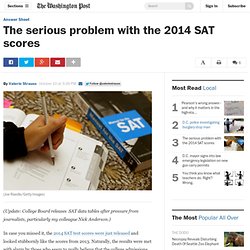

The serious problem with the 2014 SAT scores. (Joe Raedle/Getty Images) (Update: College Board releases SAT data tables after pressure from journalists, particularly my colleague Nick Anderson.)

In case you missed it, the 2014 SAT test scores were just released and looked stubbornly like the scores from 2013. Naturally, the results were met with alarm by those who seem to really believe that the college admissions exam scores are truly reflective of readiness for college and/or how well an individual student will do in college. If they really were that valuable, the College Board, which owns the exam, wouldn’t be creating a substantially revised test — set for unveiling in 2016 – for the second time since 2005. While the results didn’t budge, there was something different this year in the way the exam results were announced.
So, why were the scores released together for the first time? Makes sense. Anderson suggests a reason for that. If you had to announce something but the news wasn’t good, what would you do? ! Why Standardized Tests Don't Measure Educational Quality - ASCD Educational Leadership Magazine. March 1999 | Volume 56 | Number 6Using Standards and Assessments Pages 8-15 W.

James Popham Educators are experiencing almost relentless pressure to show their effectiveness. Unfortunately, the chief indicator by which most communities judge a school staff's success is student performance on standardized achievement tests. These days, if a school's standardized test scores are high, people think the school's staff is effective. One of the chief reasons that students' standardized test scores continue to be the most important factor in evaluating a school is deceptively simple. What's in a Name? A standardized test is any examination that's administered and scored in a predetermined, standard manner. Standardized aptitude tests predict how well students are likely to perform in some subsequent educational setting. But standardized achievement-test scores are what citizens and school board members rely on when they evaluate a school's effectiveness.
A Standardized Test's Assessment Mission. Why many Democrats have turned against teachers unions. Randi Weingarten (AFT) For years now it’s been clear that Democrats have splintered over the issue of corporate school reform.

President Obama and Education Secretary Arne Duncan have been leaders of the movement to transform public schools through standardized-test-based “accountability” and the expansion of charter schools, with other Democrats arguing that these reform measures are not effective ways of closing the achievement gap and improving student performance. That split came into stark relief with the recent verdict in Vergara v. California in which a judge threw out state statutes giving job protection to teachers. The plaintiffs had argued that tenure and other protections that had been negotiated by teachers unions deprived students of their constitutional right to an adequate education. DCPS and TUDA. One of the biggest stories coming out of the 2013 NAEP TUDA data release, especially for those inside the beltway, were the results for District of Columbia Public Schools (DCPS).

When state-level NAEP results came out last month, Washington, D.C., showed strong gains. But since charters (which enroll nearly half of the city’s children) were included in the results, it was impossible to tell how the district alone had fared. But the success of IMPACT on human-capital practices and last year’s positive state test scores suggested the district was headed in the right direction. NAEP TUDA results include only district schools in D.C. (since charters are their own LEAs), and 21 districts participate in this test. At first blush, the results are very positive. There is no doubt that this feels like a good-news story for the city. But a dig through the numbers reveals a more complicated story—and one that’s not as uplifting as the headlines.
First, this progress needs to be put into context. S gains on 2013 NAEP similar to past years, IU School of Education researcher says: IUB Newsroom: Indiana University. Nov. 7, 2013 BLOOMINGTON, Ind. -- The U.S.

Department of Education released results today for the National Assessment of Educational Progress. Again, Indiana students showed gains, though they were not substantially different from past gains, according to analysis from an Indiana University School of Education professor who researches the NAEP exam results. At Grade 4, Indiana’s mathematics score was 249, a 5-point improvement from the last assessment in 2011 and 8 points above the national average. Indiana’s Grade 4 reading score was 245, a 4-point gain from 2011 and 4 points above the national average.